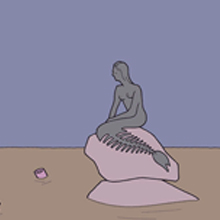
A lo largo de la historia, Francia ha sido un bastión de la libertad de expresión, así como un faro de la caricatura de la prensa. Junto con Inglaterra, fueron los auténticos impulsores y promotores del arte de la caricatura moderna, siendo sus artistas los principales maestros del humor gráfico en el mundo. Para entender mejor lo que pasa en la mente humorística francesa, hablamos con el dibujante Carlos Brito Ferreira do Amaral, un franco-portugués que emigró allí a principios de los años sesenta y allí, no sólo ganó en el duro terreno que es la prensa francesa, cómo ha vivido los cambios de más de medio siglo de vida gala.
Brito: En cuanto a mi nacionalidad, además de portugués, también soy francés, estoy naturalizado desde hace casi 40 años. Eventualmente, puede considerarme francés entre comillas, pero el hecho es que, en términos de experiencia, soy mucho más francés que portugués, ya que viví alrededor de 56 años en Francia, mientras que solo 21 años y medio en Portugal, así como 1 año en Alemania. También destaco que soy un ciudadano del mundo debidamente registrado desde hace al menos 20 años. De hecho, al no ser ya muy portugués y, por otro lado, al no ser completamente francés, puedes considerarme como un ser culturalmente híbrido y nacionalmente poco definido. Lo cual me queda perfecto.
Francia, junto con Inglaterra, ha sido un referente internacional del humor gráfico y la caricatura. ¿Esto hace que el humor francés sea universal o hay un humor francés específico?
Brito: Prefiero con mucho el llamado humor inglés al humor francés, que, por cierto, no aprecio mucho. Tampoco aprecio el humor portugués. Lo que no me impide apreciar a ciertos comediantes franceses así como a algunos comediantes portugueses. Y para apreciar, por supuesto, los ingleses, pero no los estadounidenses. También aprecio el humor judío, pero no los judíos sin humor que pretenden que solo ellos pueden contar anécdotas llenas de "judaísmo"...
Francia es un país enorme y la cultura occitana es diferente a la del norte de Francia, la de los británicos es diferente a la de los alsacianos... ¿Notas estas diferencias en Francia? ¿Qué caracteriza al humor francés?
Brito: No creo que haya grandes diferencias entre el «humor» bretón, alsaciano o parisino. Por cierto, no creo que exista el humor bretón, como el alsaciano o el parisino… ¿Parisino de París o parisino de la región parisina? Entre los muchos dibujantes de cómics franceses con los que me he cruzado a lo largo de mi vida profesional, no he sentido ninguna diferencia ligada al origen geográfico de tal o cual. Porque la mayoría de ellos lamentablemente carecían de lo que yo llamo humor y que es una versión muy singular y restrictiva de lo que la mayoría de la gente llama humor... Y asumo plenamente el elitismo que esto implica de mi parte. Finalmente, y sin ningún tipo de racismo, el humor que más aprecio es el humor negro.
No sé qué caracteriza al «humor francés» y no creo en su universalidad. Pero creo en la universalidad del Humor que, sea cual sea la latitud en que se encuentre, transforma las tragedias en comedia humana.
¿Se puede decir que el humor cinematográfico, literario, gráfico es diferente? ¿Hay diferencias según los géneros artísticos?
Brito: Creo que cada forma de expresión del genio creativo humano, así como su imbecilidad, tiene sus propios códigos, pero estos pueden eventualmente circular entre los diferentes soportes de comunicación que tenemos. En lo que a mí respecta, creo que puedo relacionarme con el humor de las películas mudas. Pero sin piano como sonido de fondo. Quizás por eso, hace unos años presenté una exposición en Saint-Just-le-Martel titulada "Cent dessins sans paroles": los dibujos no tenían títulos ni diálogos y al final de la exposición había una lista de títulos que Se invitó a los visitantes a emparejar los dibujos. Desafortunadamente no pude encontrar a nadie que quisiera presentar la versión "Cien dibujos sin palabras" en Portugal...
Siempre ha habido grandes periódicos de humor en Francia y acabaste trabajando en alguno de ellos. ¿Cómo se vivía el humor cuando llegaste a Francia en los años sesenta?
Brito: El gran salto de los sesenta se produjo gracias a «Hara Kiri» de Cavanna y Choron ya diseñadores como Siné, Topor y otros colaboradores de esta publicación. En cierto modo, al igual que el New Vague cinematográfico, se puede considerar que hubo una pequeña revolución en el campo del humor francés gracias a Reiser, Gébé y Cabu, aunque dibujantes como Bosc, Mose o Chaval ya habían trabajado en profundidad en dicho terreno.
¿Crees que el cambio de milenio y las nuevas tecnologías terminaron por influir negativamente en el humor y la irreverencia francesa? Hoy vivimos en una aldea global con muchas más susceptibilidades...
Brito: Los malísimos «políticamente correctos» importados de Estados Unidos (como hace muy poco la infame «cancelar cultura», que prueba que tenemos una propensión muy imbécil a importar lo peor de la producción «intelectual» made in USA), tuvo una influencia muy nefasta en la expresión del humor en todas partes y también en Francia. Hoy, comediantes como Desproges o Coluche serían objeto de linchamiento en las redes sociales o incluso en la plaza pública y terminarían siendo traducidos en los tribunales como anti-esto-y-aquello o pro-cualquier otra cosa. El mismo director de “Charlie Hebdo”, el artista Riss, participó tristemente en la acusación de antisemitismo lanzada en los Estados Unidos contra el artista António…
Naturalmente, el atentado terrorista fundamentalista contra “Charlie Hebdo” fue un duro golpe a la imbecilidad religiosa, a la estupidez humana, ahora de idiotas islámicos, pero cuya idiotez humana lamentablemente prolifera también en otras (supuestas) religiones, filosofías, clubismos o ideologías. Dicen que la inteligencia es un don predominantemente humano, pero no es cierto. Al margen de todo este panorama actual, ¿fue el ataque a «Charlie Hebdo» un duro golpe a la libertad de expresión del humor francés? «La hipocresía de muchos autoproclamados «je suis Charlie» tanto en el ámbito político como en los medios franceses me resulta evidente porque el espacio dedicado al diseño de prensa se reduce progresivamente y el último baluarte acabará siendo Internet.
¿Cómo definiría el humor francés contemporáneo y cuál es su futuro? ¿Vas a seguir siendo tan irreverente como siempre o vas a ser cada vez más políticamente correcto como el resto del mundo?
Brito: Hoy, muchos de los dibujos que publiqué en Le Monde, donde colaboro regularmente durante 28 años, no se publicarían... Creo que esto responde a tu última pregunta.
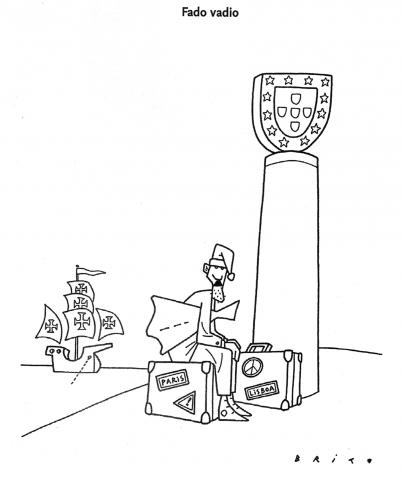
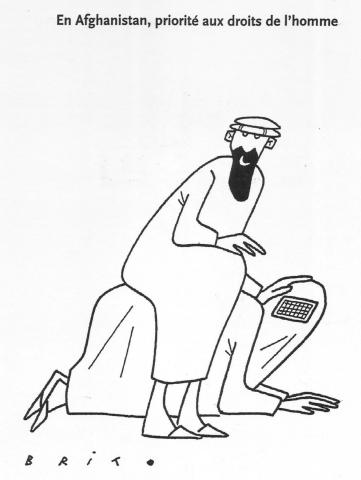
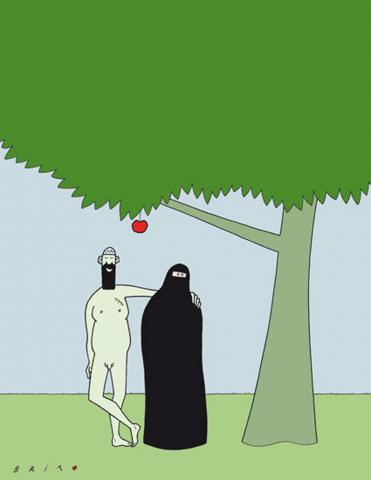
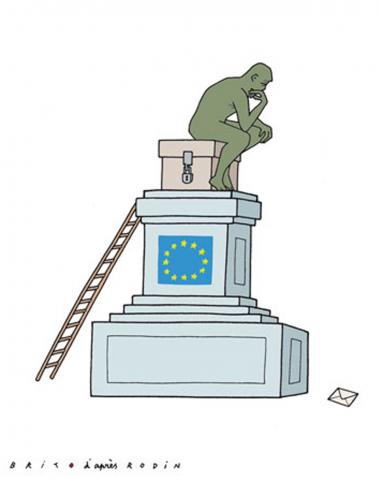
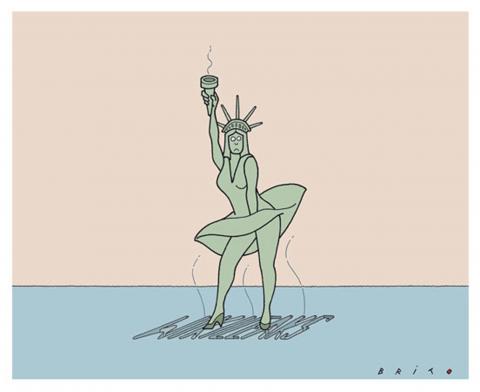
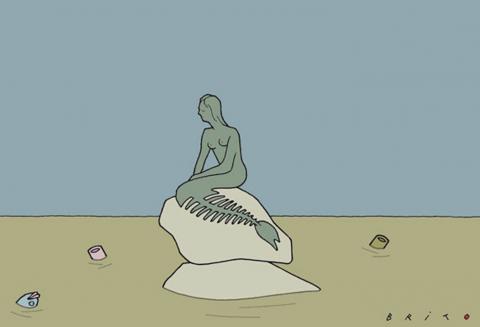
France throughout history has been a stronghold of free speech as well as a beacon of press caricature. Along with England, they were the real promoters and promoters of the art of modern cartoonism, with their artists being the main masters of graphic humor in the world. To better understand what goes on in the French humorous mind, we spoke with the cartoonist Carlos Brito Ferreira do Amaral, a French-Portuguese who emigrated there in the early sixties and there, not only won in the hard terrain that is the French press, how he has experienced the changes of more than half a century of Gallic life.
Brito: In terms of my nationality, in addition to Portuguese, I am also French, this has been naturalized for almost 40 years. Eventually, you can consider me as a French between quotes but the fact is that in terms of experience I am much more French than Portuguese as I have already lived about 56 years in France while only 21 and a half years in Portugal as well as 1 year in Germany. I also emphasize that I have been a duly registered citizen of the world for at least 20 years. In fact, not being very Portuguese anymore and, on the other hand, not being completely French, you can consider me as a culturally hybrid being and nationally little defined. Which suits me perfectly.
France, along with England, has been an international beacon of graphic humor and caricature. Does this make French humor universal, or is there a specific French humor?
Brito: I much prefer the so-called English humor to French humor, which, by the way, I don't appreciate very much. I also don't appreciate Portuguese humour. Which doesn't stop me from appreciating certain French comedians as well as some Portuguese comedians. And to appreciate, of course, the English, but not the Americans. I also appreciate Jewish humor, but not humorless Jews who pretend that only they can tell anecdotes full of "Jewishness"...
France is a huge country and the Occitan culture is different from that of northern France, that of the Britons is different from the Alsatians... Do you notice these differences in France? What characterizes French humour?
Brito: I don't think there are big differences between Breton, Alsatian or Parisian « humour ». By the way, I don't think Breton humor exists, like Alsatian or Parisian humor… Parisian from Paris or Parisian from the Parisian region? Among the many French comic artists that I have come across throughout my professional life, I have not felt any differences linked to the geographic origin of this or that one. For most of them were sadly lacking in what I call humor and which is a very singular and restrictive version of what most people call humor... And I happen to fully assume the elitism that this implies on my part. Finally and without any form of racism, the humor I appreciate the most is black humor.
I don't know what characterizes «French humour» and I don't believe in its universality. But I believe in the universality of Humor which, whatever latitude it may be, transforms tragedies into human comedy.
Can it be said that cinematographic, literary, graphic humor is different? Are there differences according to artistic genres?
Brito: I think that each form of expression of human creative genius, as well as its imbecility, has its own codes, but these can eventually circulate between the different communication supports that we have. As far as I'm concerned, I think I can relate to the humor of silent films. But without piano as background sound. Perhaps for this reason, a few years ago I presented an exhibition in Saint-Just-le-Martel entitled "Cent dessins sans paroles": the drawings had neither titles nor dialogues and at the end of the exhibition there was a list of titles that visitors were invited to to match the drawings. Unfortunately I couldn't find anyone who wanted to present the version "One hundred drawings without words" in Portugal...
There have always been great humorous newspapers in France and you ended up working in some of them. How was humor lived when you arrived in France in the sixties?
Brito : The big break in the sixties happened thanks to “Hara Kiri” by Cavanna and Choron and to designers like Siné, Topor and other contributors to this publication. In a way, like the cinematographic New Vague, it can be considered that there was a small revolution in the field of French humor thanks to Reiser, Gébé and Cabu, although cartoonists like Bosc, Mose or Chaval had already worked in depth on such terrain .
Do you think that the turn of the millennium and new technologies ended up negatively influencing French humor and irreverence? Today we live in a global village with many more susceptibilities...
Brito: The very evil «politically correct» imported from the United States (like very recently the infamous «cancel culture», which proves that we have a very imbecile propensity to import the worst of the «intellectual» production made in USA) had a very harmful influence on the expression of humor everywhere and also in France. Today, comedians like Desproges or Coluche would be the object of lynching on social networks or even in the public square and would eventually be translated in court as anti-this-and-that or pro-anything else. The director of “Charlie Hebdo” himself, the artist Riss, sadly participated in the accusation of anti-Semitism launched in the United States against the artist António…
Naturally, the terrorist, fundamentalist attack on «Charlie Hebdo» was a heavy blow to religious imbecility, human stupidity, now by Islamic idiots, but whose human idiocy unfortunately also proliferates in other (so-called) religions, philosophies, clubisms or ideologies. They say that intelligence is a dominantly human gift, but it is not true. Apart from all this current scenario, was the attack on «Charlie Hebdo» a hard blow to the freedom of expression of French humor? «The hypocrisy of many self-proclaimed «je suis Charlie» both in the political field and in the French media is evident to me because the space dedicated to press design is progressively reduced and the last stronghold will end up being the Internet.
How would you define contemporary French humor and what is its future? Are you going to remain as irreverent as ever or are you going to be increasingly politically correct like the rest of the world?
Brito: Today, many of the drawings that I published in “Le Monde”, where I collaborated regularly for 28 years, would not be published... I think this answers your last question.
